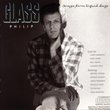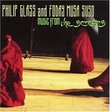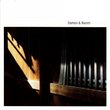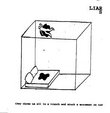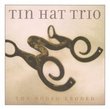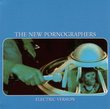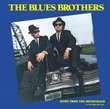| All Artists: Terry Riley, Kronos Quartet Title: Terry Riley: Requiem for Adam / The Philosopher's Hand Members Wishing: 4 Total Copies: 0 Label: Nonesuch Original Release Date: 1/1/2001 Re-Release Date: 9/4/2001 Genres: International Music, Jazz, Classical Styles: Chamber Music, Historical Periods, Classical (c.1770-1830), Modern, 20th, & 21st Century Number of Discs: 1 SwapaCD Credits: 1 UPC: 075597963922 |
Search - Terry Riley, Kronos Quartet :: Terry Riley: Requiem for Adam / The Philosopher's Hand
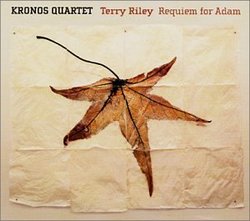 | Terry Riley, Kronos Quartet Terry Riley: Requiem for Adam / The Philosopher's Hand Genres: International Music, Jazz, Classical
The Kronos Quartet turns in a spectacular performance of three unusually dissimilar Terry Riley compositions grouped under the title Requiem for Adam. Ostensibly the three parts of Requiem are based on the memory of Adam H... more » |
Larger Image |
CD DetailsSynopsis
Amazon.com The Kronos Quartet turns in a spectacular performance of three unusually dissimilar Terry Riley compositions grouped under the title Requiem for Adam. Ostensibly the three parts of Requiem are based on the memory of Adam Harrington, the son of Kronos's David Harrington, but none of these works is particularly funereal. The perky, Bartók-influenced "Ascending the Heaven Ladder" gives way (unaccountably) to the harsh electronics of the composer-assisted second movement, "Cortejo Funebre en el Monte Diablo," which in turn leads to the energetic third movement, "Requiem for Adam." This music might have a hard time finding a new audience, but Riley fans--as well as Kronos enthusiasts--will revel in the music and the warm studio ambience. However, the final work here, a five-minute improvisational knockoff called "The Philosopher's Hand," finds Riley on the piano in a deeply meditative mood that could have gone for another hour. It promises much for the future of solo piano music from this gifted composer. --Paul Cook Similarly Requested CDs
|
CD ReviewsA uniquely moving memorial Jeff Abell | Chicago, IL USA | 09/14/2001 (5 out of 5 stars) "Terry Riley has my vote for the title of great American composer. Few composers working today have Riley's ability to range from unbridled fun to profound emotional depth. His long collaboration with the Kronos Quartet brings us this latest work, certainly one of Terry's deepest and most moving. Composed as a memorial after the death of 16-year-old Adam Harrington (son of the Kronos' first violinist), who shared a birthday with Terry's own son, the result is music of great emotional and psychological richness. In the middle movement, electronic sounds, suggestive of pop music, joins the quartet - a homage to the energy and tastes of the young man it memorializes. In the last movement, sliding tones suggest (to my ear) ambulance sirens, even as the work reaches a sense of reassurance in the midst of suffering. In total, it is a work of great tonal beauty and an immeasurable humanity. I bought this CD the day before the World Trade Center was hit, and it has been the one piece of music I've found consoling in the days since that event. It is a mark of Terry's own beauty of spirit that his music speaks to us on such a level. Listen to this work." String quartets not Riley's forte R. Hutchinson | a world ruled by fossil fuels and fossil minds | 09/18/2001 (3 out of 5 stars) "I would truly like to be positive toward this record, particularly given its subject matter. (When I ordered it, based on the title, I assumed it was about the Adam of the Bible, perhaps symbolic of humanity...) I love Riley's "In C" and "A Rainbow in Curved Air," and the works of the Kronos Quartet. But this work doesn't move me. Actually, the last piece, a solo piano improvisation by Riley dedicated to Riley's teacher Pandit Pran Nath, who passed away in 1996, is much more affecting than the string quartet, which I think says something. The first movement of the quartet ("Ascending the Heaven Ladder") is strong, but the electronic effects in the second movement seem out of place, and the long third movement just seems to lose momentum. Come to think of it, Riley seems to share with the other "minimalists" a tendency to become less compelling in moving away from the purity of the initial vision/impulse. The artwork on this CD is stunning, though, a series of photos of dead leaves called "Black Pulse."" Requiem without despair Allen Ruch | Brooklyn, NY USA | 10/03/2002 (4 out of 5 stars) "Written to mark the premature death of Adam Harrington, teenage son of Kronos violinist David Harrington, "Requiem" is an unusual piece for a work bearing that title. Cut from the same cloth as Riley's previous (and underrated) string quartets, for the most part it would sound at home on "Cadenza at the Night Plain" or "Salome Dances for Peace." It starts with a very energetic movement, somewhere between a scherzo and a loose fugue based on a few simple patterns. But the middle movement comes as a surprise, a sudden burst of electronic instruments announcing a quasi-industrial section rich in complexity. (It actually sounds reminiscent of King Crimson's "ProjeKct" pieces.) The third and final movement returns to the unassisted quartet. Subtitled "Requiem for Adam," its long, sliding notes and anxious motion suddenly give way to a stately, processional interlude suffused with a tender sadness and a gnawing uncertainty. The piece ends with a return to the dance-like energy, closing on a final coda expressed as the two syllables in Adam's name. Perhaps less a traditional requiem than a musical portrait, it's nevertheless a thoroughly fascinating and occasionally moving work. It's followed by "The Philosopher's Hand," a gentle piano solo improvised by Riley in the memory of his mentor, Pandit Pran Nath."
|

 Track Listings (4) - Disc #1
Track Listings (4) - Disc #1
